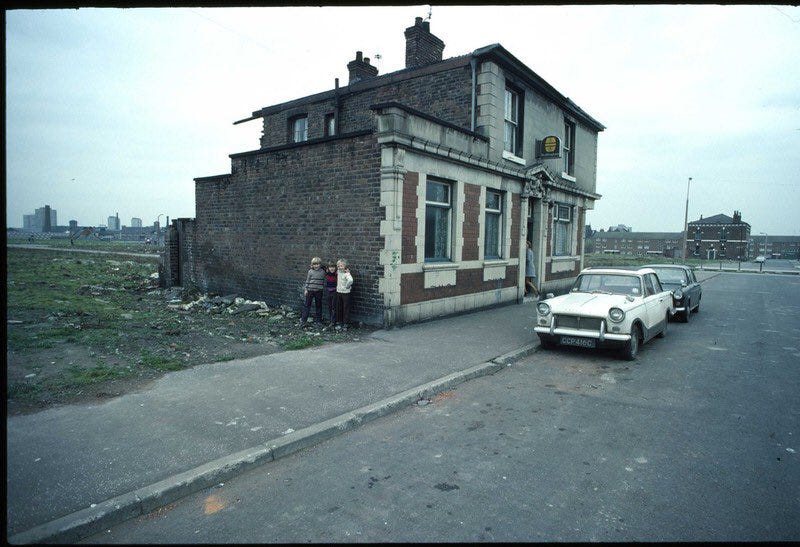The Guilt of Taking Up Space
The unspoken unease of lingering in public houses during a time of financial crisis.
It’s become second nature to me to think about my local pub as a place to go when my own house has become stale of inspiration. However, I am going less. Like everyone else in the country, I have higher bills to pay, and sadly this means a lower budget for random pints on a rainy Tuesday. I read today that Great Britain has the highest gas bills in the entire world. What a proud moment for my nation.
A pint of cask costs around £4.70 where I live, give or take any drink-it-dry offers or cheaper prices in clubs I’m not a regular in. If I stay for the afternoon with my notebook with just one pint, because my budget for that day was a fiver on random spends, I’ve started to feel something I never used to experience: guilt. It’s self-imposed—nobody at the pub is willing me to buy more. But I know, as a patron and a bar owner, that it costs so much more to keep a pub open right now. That I am potentially (although, sadly, not usually, given how quiet pubs are these days) taking up space a more voracious spender could be using. And that while this didn’t used to matter—all were welcome—it’s become so much more of a pertinent issue.
In Ruby Tandoh’s latest piece for Vittles Restaurants as Living Rooms, she discusses the use of chain restaurants as places to exist, and her own experience of a local MacDonald’s reminded me of this piece from 2016 which I come back to a lot: McDonald's: you can sneer, but it's the glue that holds communities together, by Chris Arnade, a writer who covers addiction and poverty in America. When we have no public spaces to utilise, when our homes aren’t the ideal space for us in that moment, we turn to what we have. And what we have is MacDonald’s. Pret A Manger, Wetherspoons.
Yes, Wetherspoons. I’m a former employee and I fucking hate that guy. But I can’t deny that Wetherspoons offer something most pubs do not—anonymity. A strange USP, when pubs in their best incarnations are places of warm, personal hospitality. But it’s this detachment from life, this formation of a pub-as-liminal-space that makes a Wetherspoons pub so welcoming to many. Ruby Tandoh mentions a friend in her Vittles essay, who talks about not having to “perform gratitude”. About using up space, sitting for a while with amenities and warmth and quiet, without guilt. I can understand this. There are no spaces in our urban areas where we can sit in comfort. Hostile architecture has seen to that. If we want to do anything in a town centre other than move forward and consume, we need to pay for the privilege. Wetherspoons are loved—almost definitely so—by many for their low prices and unpretentiousness (however the one on Blackpool seafront has gleaming Chesterfields, a fake library and poetry on the walls). But I don’t think it’s just the low prices people like. It’s the fact they don’t feel they will be judged for paying them.
What judgement is this? The same shame I feel when I don’t stay for another pint? It’s internalised, my friends. Your friendly local publican is only asking you how you are because they want to know. They’re taking your empty glass because they’re about to put the glasswash on, not to passive-aggressively point out that you’ve finished. If there is any one place you are not being judged, it is your local pub. And if you are,
it’s only by Ken, and he drinks Tetleys and got abducted by aliens on Scammonden Dam.
Other Stuff
Pellicle’s first story about cider in 2023, by Helen Jerome
Matthew Curtis on the price of a pint, for Get ‘Er Brewed
I really liked this post on Insta by Beak Brewery—a transparent look at how they brew their IPAs, why they have changed the way they brew them, and what that means.
Some venues in Manchester’s Gay Village have long been accused of racism (well, as long as I’ve been going out), this past week more allegations have been made against bar owners and door staff. This piece from Vice in August last year and this Tweet thread from last weekend are your starting points to learn about this if you’ve not already heard about it.
Why do people like Guinness? By Boak and Bailey.
The Hand on Heart report on Brewdog’s Affected Worker’s Platform is now available to view.
Lonely Pubs, from a series by John Bulmer
I like this one because you can see someone going inside. It’s still a pub.





